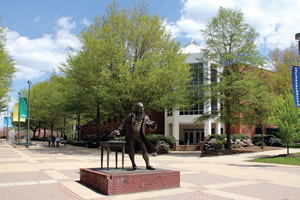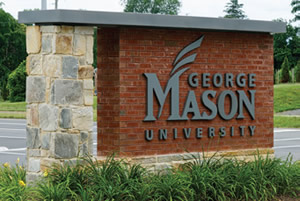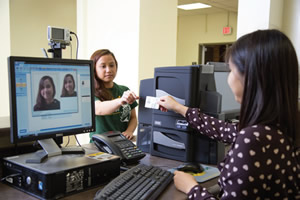George Mason University
Project Snapshot
PROJECT: Smart Card Technology Upgrade
INSTITUTION: George Mason University
LOCATION: Fairfax, VA
COMPANY NAME: HID Global
WEBSITE: hidglobal.com

As the commonwealth of Virginia’s largest public university, George Mason University has a population of more than 35,000 students, faculty members, and contractors. The university needed a cost-effective migration plan to replace its outdated and vulnerable ID card system.
THE CHALLENGE
For over a decade, George Mason University has issued magstripe ID cards that not only wore out quickly, but relied on older security technology that lacked the cryptographic capabilities of smart cards, making them susceptible to cloning and counterfeiting. It was also difficult to update and manage old campus door locks and cards.
Greater campus security could be achieved by moving to a new contactless smart card technology, but the greatest efficiency and convenience would come from leveraging the power of a flexible, “one card” solution that enabled the Mason ID to be used with not only access control systems, but other value-added applications and services on and off campus.
THE SOLUTION
 By working with HID Global and its parent company ASSA ABLOY, George Mason was able to design a cost-effective and comprehensive ID solution that would enable university administrators to migrate their existing card system. Simultaneously compatible with the legacy student ID cards and the existing hardware on campus, this new solution would be deployed slowly and consist of the following:
By working with HID Global and its parent company ASSA ABLOY, George Mason was able to design a cost-effective and comprehensive ID solution that would enable university administrators to migrate their existing card system. Simultaneously compatible with the legacy student ID cards and the existing hardware on campus, this new solution would be deployed slowly and consist of the following:
HID Global multiCLASS SE readers, as well as PERSONA Campus™ Software, and SARGENT Passport locks from HID Global’s parent company ASSA ABLOY provide built-in encryption and enhanced security.
Seos smart cards from HID Global deliver advanced security, interoperability between the new locks and readers and multiple card applications enabled by its breakthrough technology leveraging HID Global OMNIKEY® desktop readers to extend the Seos card’s use.
Powered by Seos smart card technology, the new George Mason ID cards are initially being used for accessing facilities, residence halls, and library and cafeteria services. To date, George Mason has installed approximately 3,500 new locks and readers and has issued more than 12,000 new ID cards to incoming freshmen.
IMPACT ON LEARNING
 The university now has state-of-the-art facility security as well as real-time control when a lock-down or other changes are needed. They also can quickly and easily modify their access control system, including updating card privileges, revoking or replacing lost/stolen cards and adding or removing applications.
The university now has state-of-the-art facility security as well as real-time control when a lock-down or other changes are needed. They also can quickly and easily modify their access control system, including updating card privileges, revoking or replacing lost/stolen cards and adding or removing applications.
The move to a Seos-based technology solution has provided the university with more freedom of choice and the ability to add more applications as it scales in the future, while providing the confidence that the university is receiving the best-in-class security and privacy protection for its students and staff. Giving students a safe place to live and learn are two key components in creating a great educational experience.
Editor’s Review
Studies have shown that students learn more effectively in environments that they perceive to be safe and secure. Ensuring that a campus has in place an up-to-date, integrated, monitored, and maintained security system and providing students an ID card that is linked to that system—a card that allows and monitors their access to facilities—is visible reassurance that their university is taking safety and security seriously.
This article originally appeared in the College Planning & Management March 2018 issue of Spaces4Learning.